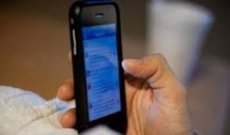New publications
An evening with a smartphone can trigger a hunger attack
Last reviewed: 02.07.2025

All iLive content is medically reviewed or fact checked to ensure as much factual accuracy as possible.
We have strict sourcing guidelines and only link to reputable media sites, academic research institutions and, whenever possible, medically peer reviewed studies. Note that the numbers in parentheses ([1], [2], etc.) are clickable links to these studies.
If you feel that any of our content is inaccurate, out-of-date, or otherwise questionable, please select it and press Ctrl + Enter.

Specialists at one of the Chicago universities, after conducting research, concluded that the blue glow of modern gadgets' screens provokes a feeling of hunger. In particular, scientists talked about smartphones, tablets and other inventions that are used at night.
As research by specialists has shown, approximately 15 minutes after using modern devices, a person began to feel hungry, which did not go away for the next two hours. At the same time, scientists noted that the feeling of hunger arose regardless of the last meal. As specialists noted, just three hours spent in the evening with a smartphone can disrupt glucose metabolism in the body and cause a feeling of hunger.
Modern people are increasingly using a tablet or smartphone before going to bed.
In earlier studies, experts from the University of Hertfordshire showed that the passion for modern gadgets increased the number of British adults suffering from sleep deficit over the course of a year. Due to the resulting problems with sleep, a person decides to have a snack, which, in turn, leads to problems with excess weight.
In addition, mobile phone screens put additional strain on the eyes. In addition to the brightness of the backlight, the two-dimensional image plays a major role in this. The human eye is able to distinguish three-dimensional objects, so when working with smartphones, the eye must adapt. As a result, working with electronic devices leads to many negative health consequences.
For example, recently a young Chinese man began to have serious problems with his vision after using a smartphone for a long time. The young man had been texting his girlfriend almost non-stop for about a week, which caused the young man to have retinal detachment. Doctors were able to perform an emergency operation and restore his vision. If the doctors had not done it in time, the young man could have remained blind. The retina is a light-sensitive element that sends signals to the brain via the optic nerve. Retinal detachment is characterized by sharp flashes or spots appearing before the eyes. As a rule, retinal detachment develops in old age, but recently more and more young people suffer from this disease due to the active use of modern electronic devices.
Experts also warn that frequent use of gadgets can provoke not only detachment, but also myopia. As Dr. David Allamby (founder of one of the clinics in the United States for solving vision problems) notes, since 1997, when the first mobile devices entered the market, cases of myopia have increased by 35%. At the same time, experts warn that in the next ten years the figure may increase to 50%.
Myopia is a condition in which a person can barely distinguish objects that are far away. The name of the disease comes from the fact that people suffering from myopia usually bring an object close to their eyes to see it.
 [ 1 ]
[ 1 ]
